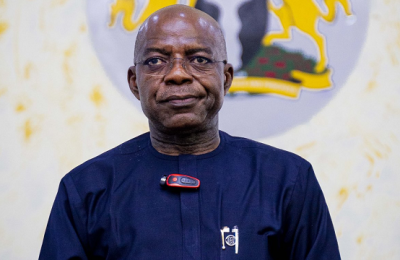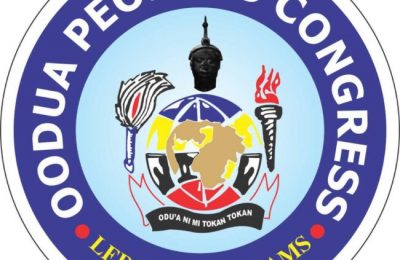
President Bola Ahmed Tinubu formally presented a budget of N27.5 trillion for the 2024 fiscal year to the joint session of the National Assembly on Wednesday.
The newly adopted parameters in the budget estimates showed that N9.92 trillion is allocated for non-debt recurrent expenditure, while debt service is projected to be N8.25 trillion, and capital expenditure is N8.7 trillion, respectively.

Addressing the Senators and members of the House of Representatives, President Tinubu announced his administration’s resolve to adopt the “revised 2024-2026 Medium Term Expenditure Framework (MTEF) and Fiscal Strategy Paper (FSP)” as the parameters for the 2024 budget, yet to be presented to the National Assembly.
Mr. President also announced the administration’s plan to grow the economy by a minimum of 3.76 percent, above the forecasted world average, with inflation expected to moderate to 21.4 percent in 2024.
According to him: “After a careful review of developments in the world oil market and domestic conditions, we have adopted a conservative oil price benchmark of $77.96 per barrel and a daily oil production estimate of 1.78 million barrels per day. We have also adopted a Naira to US Dollar exchange rate of N750 per US Dollar for 2024.
“Accordingly, an aggregate expenditure of N27.5 trillion is proposed for the Federal Government in 2024, of which the non-debt recurrent expenditure is N9.92 trillion while debt service is projected to be N8.25 trillion and capital expenditure is N8.7 trillion.
“Nigeria remains committed to meeting its debt obligations. Projected debt service is 45% of the expected total revenue.
“Budget deficit is projected at N9.18 trillion in 2024 or 3.88 percent of GDP. This is lower than the N13.78 trillion deficit recorded in 2023, which represents 6.11 percent of GDP.
The deficit will be financed by new borrowings totaling N7.83 trillion, N298.49 billion from Privatization Proceeds, and N1.05 trillion drawdown on multilateral and bilateral loans secured for specific development projects.”
While reiterating his administration’s resolve towards broad-based and shared economic prosperity, he disclosed that plans are ongoing to review the social investment programmes to enhance their implementation and effectiveness. In particular, the National Social Safety Net project will be expanded to provide targeted cash transfers to poor and vulnerable households.
“In addition, efforts will be made to graduate existing beneficiaries toward productive activities and employment.
“We are currently reviewing our tax and fiscal policies. Our target is to increase the ratio of revenue to GDP from less than 10 percent currently to 18 percent within the term of this Administration. The government will make efforts to further contain financial leakages through effective implementation of key public financial management reforms.
In view of the limited resources available through the federal budget, President Tinubu disclosed that his administration is exploring Public Private Partnership (PPP) arrangements to finance critical infrastructure.
“We, therefore, invite the private sector to partner with us to ensure that our fiscal, trade, and monetary policies, as well as our developmental programs and projects, succeed in unlocking the latent potential of our people and other natural endowments, in line with our national aspirations.”
While giving an update on the 2023 budget performance, he disclosed that an aggregate revenue of N11.045 trillion was projected to fund the 2023 budget of N24.82 trillion with a deficit of about 6.1 percent of GDP.
As of September 30, the Federal Government’s actual aggregate revenue inflow was N8.65 trillion, approximately 96 percent of the targeted N8.28 trillion. Despite the challenges, we continue to meet our obligations.
In his remarks, Speaker Tajudeen Abbas lamented the impacts of the economic hardship on millions of Nigerians and called for urgent intervention to alleviate their sufferings.
He said: “Mr. President, it is a well-known fact that millions of our constituents are living through incredibly difficult times. For this reason, they also look to the Tinubu-led government to provide quick and sustainable solutions. The antecedents of the President and your track record in governance inspire a lot of hope in Nigerians.
“Mr. President, it is for this reason that we cannot afford to fail Nigerians. If anyone can change the rot and chart a new course for Nigeria, IT IS YOU! I have no doubt whatsoever that we can measure up to the expectations of Nigerians through your visionary leadership and the commitment of the National Assembly.
“Accordingly, the budget laid before us today should not be seen as a mere financial document but a reflection of our collective resolve to address the most critical needs of our long-suffering citizens. In order to promote economic growth and development, the 2024 Budget should prioritize social welfare programs to help reduce poverty and inequality.
“Equally important is job creation and youth empowerment in view of the large and ever-growing youth population. Failure to do this means failure to invest in our future. This budget must also prioritize investment in education and healthcare, which is critical to human capital development and a more productive workforce. Infrastructure development is another critical area of importance, which is crucial for economic growth. The biggest challenge, however, is balancing these priorities within the constraints of available resources.
“In view of this and the related challenge of a high level of public debt, the National Assembly will ensure that the 2024 budget includes concrete strategies for sustainable debt management, including measures to increase revenue and control expenditure. Specifically, the focus should be on raising more revenue through tax reform, fiscal reform, subsidy reform, foreign exchange convergence, and centralized revenue collection. In our recent engagement with MDAs on the MTEF, we emphasized the need for revenue-generating agencies to double their targets to meet the N18 trillion revenue projected in the budget.
“Mr. President, the effectiveness and legitimacy of fiscal policies depend to a very large extent on public support. As the People’s House and in line with our Legislative Agenda, the House of Representatives will convene the first national citizens’ budget town hall to harness public input and opinion on this budget.
“We are convinced that this will increase transparency and accountability, improve policymaking, and increase trust in the government. Public participation in the budgetary process has been shown to improve resource allocation and service delivery as well as a more stable and robust economy. By seeking input from citizens, we aim to understand their local needs and preferences better and allocate resources more effectively.
“Going forward, Mr. President, we will also work to institutionalize pre-budget engagements with the executive to further improve and hasten the budget process. The House has already commenced interface with MDAs through the Sectoral Debates to understand the challenges facing government agencies and identify areas for legislative intervention. All of these efforts are geared towards ensuring that we provide the necessary legislative support to your administration’s Renewed Hope Agenda.
“I cannot conclude my remarks without highlighting some of the perennial problems that have hampered the budget process in Nigeria. These are well known to Mr. President, who is an experienced ex-legislator. Although the government budget is an important tool for economic management and promoting growth and development, it has generally not met the expectations of improved service delivery and development.
“This has largely been due to challenges relating to budget enactment, budget implementation, and budget oversight. The well-known gaps in the various stages of the budget process underscore the need for budget reforms, including altering relevant sections of the Constitution and existing laws to strengthen the budget process and transform our budget into an authentic tool for development. For this reason, I propose enacting a Budget Act to strengthen the budget process and promote development outcomes. This is a well-established practice in democracies across the world.
“Mr. President, let me, on behalf of my colleagues in the National Assembly, assure you that we will give this bill the utmost priority it deserves. While we would give it accelerated consideration, we will diligently scrutinise it alongside Nigerians to ensure that when it is passed, it will be a budget that best addresses the most critical needs of our people,” he said.







